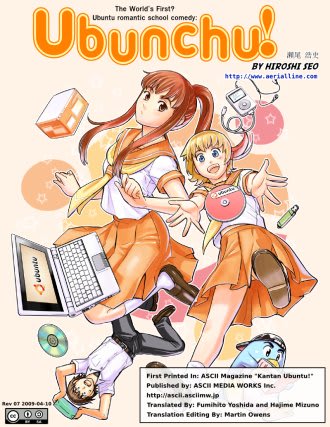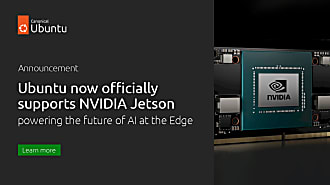Canonical
on 21 April 2020
When we launched Ubuntu back in 2004, our mission to make well-supported, free open source software available to everyone, everywhere was a bold one – but today, Ubuntu is one of the world’s most popular operating systems. One consequence of that popularity is that Ubuntu has very much entered the public consciousness, and its influence can be seen across all kinds of popular culture.
With the Ubuntu 20.04 LTS release almost upon us, we thought it would be a good time to look back over the last 16 years and highlight some of our favourite Ubuntu pop culture appearances.
TV and film
Veronica Mars
What better way to start than with the classic debate: Ubuntu vs. macOS. The teen crime drama series Veronica Mars tackled this argument way back in 2005. During the show’s eighteenth episode, one student espouses the virtues of Warty Warthog, including Live CD and Gnome 2.0. Yet despite never having tried Ubuntu, Cindy “Mac” Mackenzie (the clue’s in the name) counters that she’s content with OS X, stating: “I know what I like, and I like what I know.”
Cindy’s argument is certainly a frustrating one for any Linux fan; but fortunately, it’s now far rarer for people to be in the dark about Ubuntu, since millions of people use it every day.
Credit: Ubuntu forum user ‘Tronman’
The Big Bang Theory
Fast forward to 2010, and our next Ubuntu endorsement comes from none other than Sheldon Cooper. With its unflattering focus on the “geek” stereotype, The Big Bang Theory is often a divisive show – but we can’t help but agree with Sheldon’s sentiment in this case: “Oh, Ubuntu, you are my favourite Linux-based operating system!”
Credit: Ubuntu Forum user ‘madhi19’
Doctor Who

In the 2009-2010 two-part Doctor Who story “The End of Time” – which marked the end of David Tenant’s run as the Tenth Doctor – much of the plot centres around an alien Immortality Gate. And the Gate, it turns out, was powered by Ubuntu. In a behind-the-scenes look at the show’s set on Doctor Who Confidential you can clearly see an array of monitors sporting the Ubuntu logo.
Credit: Alan Pope; Joey Sneddon, OMG! Ubuntu!
Fresh Meat
What makes a computer valuable? According to British comedy-drama series, Fresh Meat, the answer is Ubuntu. When the main characters’ house is broken into in Season 2, Episode 5, the eccentric Howard expresses surprise that his laptop wasn’t stolen. When an unimpressed police officer asks if there’s anything noteworthy about the laptop, Howard answers: “I’ve added 16 GB to the motherboard, and it’s operating on Ubuntu.” Clearly an irresistible prize!
The Internship
2013 comedy The Internship saw two recently laid off salesmen – played by Owen Wilson and Vince Vaughan – compete with far more technically savvy applicants for jobs at Google. Although the film was a flop and currently sits at just 35% on Rotten Tomatoes, one line stands out: “Why not use emacs instead of vi as the default editor for Ubuntu?” We have to agree with the YouTube commenters that suggest this scene would have been far more believable if Wilson’s unwitting question had sparked a riot amongst all the programmers present.
Comics & manga
Mighty Avengers
Ubuntu’s popularity isn’t just limited to our reality, it’s apparently also a staple of Earth-616 – a.k.a. the Marvel Universe. In the 2007 Mighty Avengers issue 4, the villainous Ultron attempts to hack into a Lithuanian missile base to search for launch codes. The issue ends as two base employees discover the attack, and we get a close up of “ACCESS DENIED” plastered across what is unmistakably an Ubuntu GRUB boot screen.
Credit: David M Williams, iTwire
Ubunchu!

This next entry was by far our biggest surprise. Billed as “The world’s first Ubuntu romantic school comedy”, the 2008 Ubunchu! manga follows three students in a sysadmin club as they get to grips with Ubuntu. The club’s president is a hardcore CLI-only Linux fan who is initially sceptical of Ubuntu. But she’s soon won over by how easy it is to install, the automated updates, and the promise of long-term support – all of which remain core attributes of Ubuntu to this day!
Celebrity endorsements
Stephen Fry
Stephen Fry is well known for his love of Apple products, but he is also a vocal advocate for open source technology. In a 2012 interview for the UK open source event OggCamp, Fry explains: “Sometimes I do worry that [Apple] are a bit tyrannical and a bit silly”. When asked whether he uses Linux, he answers: “Yes, I use Ubuntu these-days. It seems the friendliest.”
Credit: Joey Sneddon, OMG! Ubuntu!
Jamie Hyneman
MythBusters, 7 tech headaches and how to fix them
Jamie Hyneman, co-star of the hit Discovery Channel show MythBusters, wrote an article in 2008 about common tech headaches and how to overcome them. One of those headaches was operating system software bloat, where an OS comes pre-loaded with extra software and features that are at best unnecessary and unwanted, and at worst buggy and performance-draining. Jamie’s solution? “Switch to a Linux-based operating system such as Ubuntu.”
Games
Trivial Pursuit

There are no prizes for guessing which one of these Trivial Pursuit – Family Edition questions is referring to Ubuntu. Ubuntu is an ancient African word that means ‘humanity to others’, and it is often used to remind us that ‘I am what I am because of who we all are.’ We constantly strive to bring this spirit of Ubuntu to the world of technology.
Astronomy

In April 2019, astronomers took the first ever image of a black hole, utilising a network of eight linked telescopes and an algorithm developed by computer scientist Dr Katie Bouman. During the BBC documentary that followed the team’s work, we caught a glimpse of the computers in their mission control centre, and several were running none other than Ubuntu. We were delighted to see our operating system playing a role in such a momentous event.
Credit: Will Cooke, Twitter
Amazon Alexa
From security to ease-of-use to containers, there are countless reasons why Ubuntu is the operating system of choice for so many businesses, developers, and home users – and now, even Amazon Alexa has joined Team Ubuntu. Last year, Stuart Langridge and other Twitter users reported that, when asked about her favourite operating system, Alexa answers: “My favourite would be Ubuntu.” We think she has good taste.
Credit: Twitter user Stuart Langridge; Joey Sneddon, OMG! Ubuntu!
That wraps up our top picks for Ubuntu references from the last 16 years. With Ubuntu 20.04 LTS just around the corner, we can’t wait to see how Focal Fossa stalks into popular culture. In the meantime, we’d love to hear about your favourite Ubuntu references; tweet us @ubuntu with the hashtag #UbuntuLTS.



